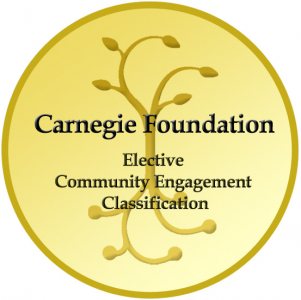About
Collaboration, partnership, and real-world problem solving
At Bates, community engagement is a prized institutional value. Since its founding in 1855, Bates has been committed to education as a means to individual and social transformation. As the college’s current-day mission statement avows, a Bates education aspires to cultivate “informed civic action” and “responsible stewardship of the wider world.” Toward this end, and with the support of the Harward Center for Community Partnerships, Bates students, faculty, and staff enact the college’s civic mission through reciprocal and sustained partnerships that connect the college and the community in mutually beneficial and transformative ways.
We use the term “community engagement” to refer to this kind of connection between Bates and the wider community. In other words, community engagement happens when Bates students, faculty, or staff collaborate with an off-campus community member or organization for the purpose of advancing community well-being, social justice, and/or the common good, and when that collaboration is characterized by reciprocity and mutual respect.
Community engagement in both the curricular and co-curricular spheres is a hallmark of a Bates education. Most students take at least one community-engaged learning course during their time at Bates, and many take several such courses, often building the knowledge, skills, and relationships to undertake research or research-based action projects in collaboration with off-campus partners. The commitment to being an engaged campus is evidenced also in athletics, the arts, residence life, the dining commons, and student clubs and organizations. As they partner with off-campus communities to address pressing needs, Bates students develop the intellectual, ethical, and personal skills needed for lifelong civic responsibility and purposeful work.
